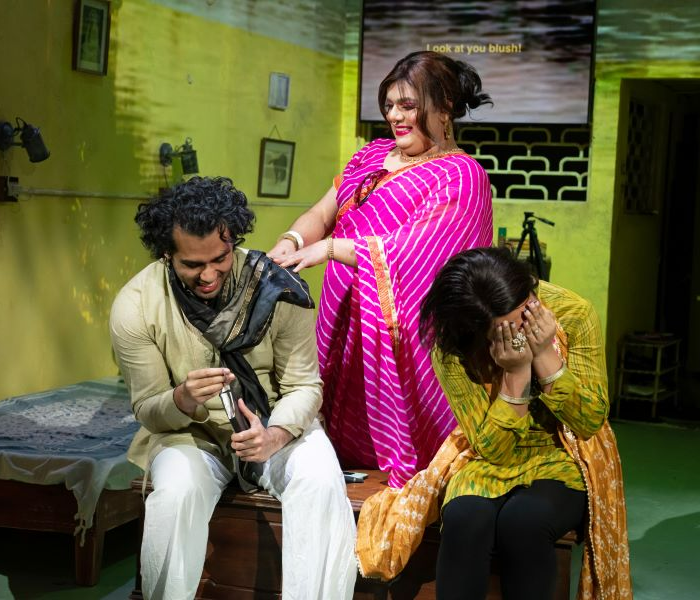Translate Page

Abrar Haque, NaFis, Tashnuva Anan in Public Obscenities. Photo by Julieta Cervantes.
Playwright-director Shayok Misha Chowdhury on his bilingual, Bengal-set drama
Don't worry if you feel a bit disoriented at the outset of Public Obscenities—that's by design. Written and directed by Shayok Misha Chowdhury, the play begins with an animated dinner conversation that bounces between topics (food, culture, Indian cinema) and tongues, specifically English and Bangla, the native language of the Indian state of West Bengal. In a bold choice, no subtitles are provided. But it gives non-Bangla-speaking audiences a taste of the culture shock Raheem (Jakeem Dante Powell), a Black American, is experiencing as he accompanies his boyfriend Choton (Abrar Haque), a Bengali American PhD student, on a trip home to Kolkata to see family and conduct research for a queer studies project.
As the bilingual production progresses, Chowdhury provides English subtitles when his characters speak Bangla. But for that first scene, he wanted theatregoers to be a bit lost in translation, though he's careful that no one gets left behind. "All the crucial information is delivered in English," he assures.
Named for a colonial era-statute in the Indian penal code that's still on the books and used to suppress queer culture, Public Obscenities received ecstatic reviews when it premiered last year at Soho Rep in a coproduction with the NAATCO National Partnership Project. Now the show is back for an encore engagement with its remarkable bilingual ensemble intact at Off Broadway's Theatre for a New Audience, co-presented with the Woolly Mammoth Theatre Company.
"For many years I had been wanting to write a play in my mother tongue and in English," says Chowdhury, who is 39 and lives in Brooklyn. "I have a strong tether back to the Indian subcontinent. I read and speak fluent Bangla and I've always felt sort of halfway between my peers growing up here in the States and my peers and family back in India. So, I began to write inside of the universe that is familiar to me, which is my joint extended family back in Kolkata, a forever hearth for me."
His keenly observed, multi-strand drama not only explores queer culture in India, but also the complicated lives of Choton's bickering aunt (Gargi Mukherjee) and uncle (Debashis Roy Chowdhury), their mysterious housekeeper (Golam Sarwar Harun) and revelations about the family's late patriarch. "In some ways, I think of Choton as an avatar of my former self," says Chowdhury, who studied at Stanford University, Columbia University and the London International School of Performing Arts. "His journey is me reflecting back on my experiences in my twenties, returning to Kolkata as an adult. I had to meet the city as a queer person, start navigating the complexities of the city in a different way. The home the characters live in, the questions they are wrestling with and the insecurities that animate them are very much rooted in myself and the people who are near and dear to me."
In mounting Public Obscenities, Chowdhury's biggest challenge was finding authentic bilingual actors. "I was very adamant that the casting attend to the specificities of each character's fluency and dialect, because it is a play about language—so many different registers of language—and about translation," he says. The work demands performers who are skilled at realism and speak Bangla with "a music that is right for the character. This is a pet peeve of mine: Even if I am watching something in a language that I'm not fluent in, I'm able to sense whether an actor is truly at home in the language. It took a year-and-a-half-long national casting search to yield the fruit that we now have. I'm very moved that the cast is 50 percent Bangladeshi and 50 percent from West Bengal, because my family is from what is now Bangladesh prior to Partition," when the region was violently divided into multiple nations. "So, the casting was this Partition healing act as well, which is kind of lovely."
In addition to Raheem, Choton and his family, Public Obscenities features two members of Kolkata's queer community: the flamboyant Sebanti (NaFis), who identifies as hijra, an officially recognized third gender in South Asia, and the vivacious Shou (Tashnuva Anan, the first trans news anchor in Bangladesh), who identifies as kothi, which encompasses many gender expressions.
"A lot of the play is wrestling with the ways in which gender categories—and language about gender—are different back in Bengal versus here in the States," explains Chowdhury. "It was important to me that the actors who play Sebanti and Shou have lived experiences that allow them to step into those roles with a fully realized truth. Even though it was never my explicit intention, by virtue of the way the play works and who we have in it, there's a great deal of activism in and around it. It has given folks like Tashnuva a platform to play a role that is true and real to them."
The production has also raised the profiles of the entire cast. "Many of them had been working primarily in Bangla community theatre contexts and never had the opportunity to appear on a professional New York stage," says Chowdhury. Now, "they are the heartbeat" of this hit show that's spotlighting a culture and language rarely seen Off Broadway. "This play has upended all of our lives in the best possible ways."
---
TDF MEMBERS: At press time, discount tickets were available for Public Obscenities. Go here to browse our latest discounts for dance, theatre and concerts.